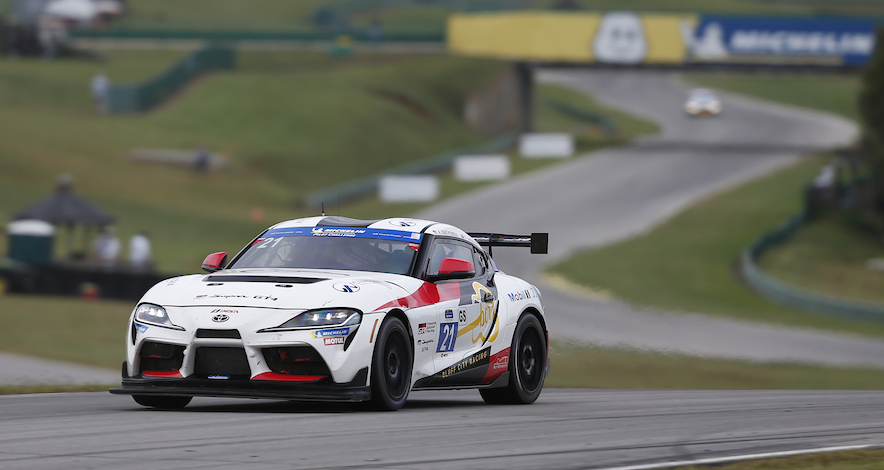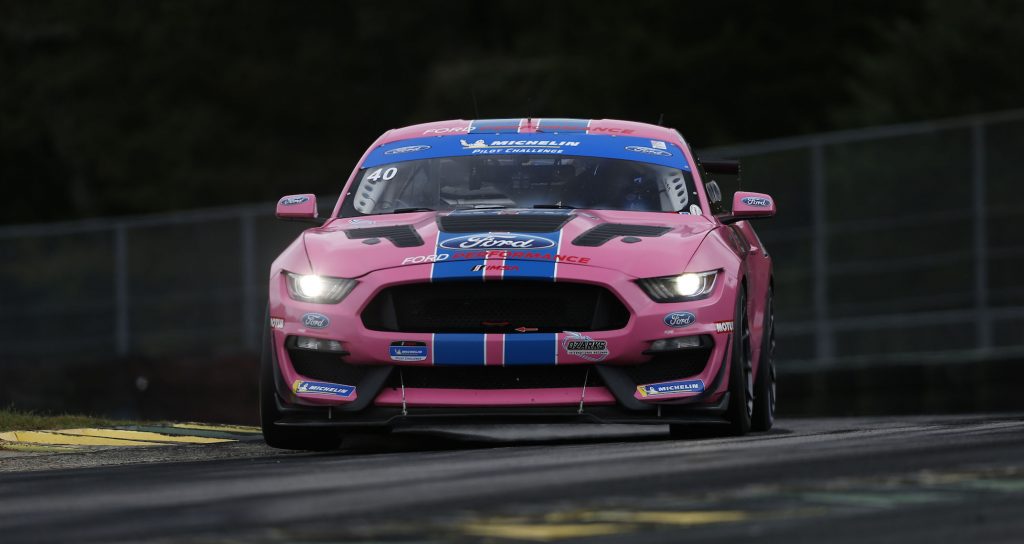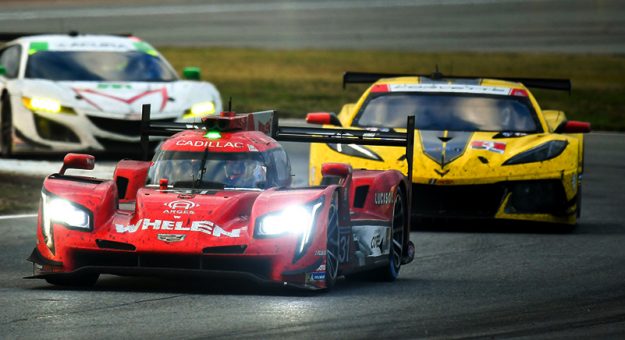Sports Car Racing Is Special to GM, Ford, Toyota Leaders
By John Oreovicz
DAYTONA BEACH, Fla. – December used to be a quiet time in the racing world. Not anymore. Cars aren’t on track throughout most of North America, but the industry is abuzz.
The second annual Online Race Industry Week webinar presented by EPARTRADE and RACER magazine last week included an array of guests from the motorsports spectrum. Of particular note to sports car fans, IMSA President John Doonan and FIA World Endurance Championship CEO Frederic Lequien were featured speakers on the opening day.
Another day was devoted to auto manufacturers, including representatives from IMSA participants General Motors, Toyota and Ford. Each had interesting takes on the landscape.
Jim Campbell – Vice President, GM Performance and Motorsport
Campbell noted that GM Racing was highly successful in 2021, with Chevrolet winning championships in NASCAR (Cup and Xfinity), NHRA and IMSA (Corvette Racing’s second consecutive GT Le Mans (GTLM) class title with drivers Jordan Taylor and Antonio Garcia), while the Action Express Racing duo of Felipe Nasr and Pipo Derani earned the IMSA Daytona Prototype international (DPi) crown in a Cadillac.
Campbell added that GM’s new 134,000-square foot technical center is nearing completion near Charlotte, North Carolina. The facility utilized by GM-affiliated stock car and sports car teams will include multiple full-motion simulators and stationary simulators.
“You can take nothing for granted in racing,” Campbell said. “You have to have a certain amount of paranoia: Are you doing enough versus the competition?”
Campbell confirmed that 2022 will be a transitional season for GM as it splits its Corvette effort between the IMSA WeatherTech SportsCar Championship and the FIA WEC. GM intends to be well positioned for 2023 when the introduction of LMDh will also allow its top-level Cadillac IMSA prototypes to compete for overall victory at WEC races, including the 24 Hours of Le Mans.
“It was a big decision, but it’s the right decision to have Cadillac go for the overall win at Le Mans,” Campbell said. “Obviously, we’ve been doing just that in the IMSA series, and have won at the top level in DP (Daytona Prototype) and now DPi. So, Cadillac going for the overall win (at Le Mans) is the right thing to do, and it’s a big effort. We’re all in on it, and we’ll have a partnership with Chip Ganassi Racing, Dallara, and we’re doing the powertrain out of our facility in Pontiac, Michigan. We’re focused on racing in North America for the overall win, and in WEC, where obviously Le Mans is a big part of the equation.
“It’s a big job, but we’re looking forward to it and actually it’s going to be super exciting,” he added. “The work that (IMSA Chairman) Jim France has done, and Pierre Fillion of the ACO, has been incredible to bring those two categories and race series together so we can race globally. It’s really an amazing thing.”
Campbell also acknowledged changes within the Corvette program that will send the Corvette C8.R driven by Nick Tandy and Tommy Milner abroad to compete in the WEC in 2022. The C8.R is being developed into a GT3 specification for 2024 that will be offered to customers worldwide for the first time.
“A lot to learn for us there, but I’m really looking forward to it,” Campbell said. “Certainly, we’ve had a great run with Corvette Racing since we debuted it in 1999. I was honored to be part of the group that brought that program to the racetrack.
“We’ve had a lot of success with that program over the years, winning drivers and manufacturers championships in all the North American series, but also eight Le Mans wins in our class. It’s also been a win taking those learnings from the track back to the showroom Corvette. Both vehicles are better … it’s our gold standard in terms of tech transfer, for sure.”

David Wilson – President, Toyota Racing Development
Wilson’s long career at Toyota Racing Development started in sports cars, working with Dan Gurney’s All American Racers on the legendary Eagle Mk III program.
“On a personal level, sports car racing is near and dear to my heart,” said Wilson. “IMSA racing was always part of my makeup. As a 28-, 29-year-old engineer newly hired by Drino Miller at TRD, I had the great honor of being an engine engineer on what I still think is one of the finest sports cars that ever raced.
“When I started 32 years ago, it wasn’t too much of an exaggeration to say that TRD was a Southern California ‘speed shop’ for Toyota,” he added. “Yet we’ve come so far.”
TRD now has two facilities. Company headquarters in Costa Mesa, California, is what Wilson called “engine and powertrain centric, along with all our manufacturing operations.” A newer location in Charlotte specializes in vehicle dynamics and simulation.
While Toyota no longer runs a prototype in IMSA competition, its Le Mans Hypercar swept every race on the 2021 WEC calendar, including Le Mans. Toyota has chosen to highlight its Lexus brand in the U.S., running two RC F GT3 entries in the GT Daytona (GTD) class of the WeatherTech Championship with Vasser Sullivan Racing.
That changes slightly in 2022, with one Lexus moving to the new GTD PRO class and the other remaining in GTD. Toyota also joined the IMSA Michelin Pilot Challenge in 2021 with its Supra GT4.
“With the Lexus brand, we’ve had these fits and starts over the years with racing,” Wilson said. “Honestly until now, there wasn’t a clear mission statement. I think it’s so important for any racing program, from a manufacturer perspective, to have a clear idea of why it is we’re racing.
“Today, what makes me very happy, is Toyota as a brand fully recognizes why they race, and why it’s important for Lexus to add motorsports and racing to their DNA. It’s about adding performance as a brand attribute to Lexus. They obviously have luxury, quality and all that nailed. Now the focus is on performance. Wait ‘til you see some of the product coming down the pipeline. It is so exciting!”

Mark Rushbrook – Global Director, Ford Performance
No car manufacturer has a longer continuous history in motorsports than Ford.
“We’re founded and based on motorsports, and we plan to keep doing that into the future,” said Rushbrook.
Ford hasn’t had a factory racing presence in the WeatherTech Championship since the successful GT program that ran a dual IMSA/WEC program from 2016-19. The company does build a GT4 version of the Mustang that is a race winner in the Michelin Pilot Challenge. A hopeful segment of the Ford sports car fan base hopes and wonders if the legendary American pony car could be produced in a GT3 spec to go head-to-head with Corvette and other marques from around the world in the future.
Rushbrook resisted moderator attempts at confirming Ford could return to sports car racing soon, but he certainly left the door open.
“We are always looking at what our different options are in racing, and as you can see, we are active in so many different series right now,” he said. “We’re always trying to make it meaningful, in terms of the relevancy and the technology. We’re in it to win, telling the story, so we’re always studying different series and what makes sense for us.
“We love all forms of racing as long as we have a good technical story and relevance, and we’re reaching the right customer,” Rushbrook added. “Sports car racing is even more relevant because the car doesn’t just look like the car, in most cases, it is the car. Especially in GT3 and GT4 class, it’s the production body-in-white and a production-based engine that you start with. So in terms of direct relevancy, it doesn’t get any better for that opportunity.”
